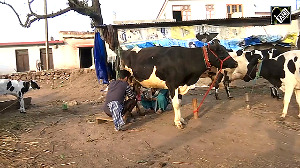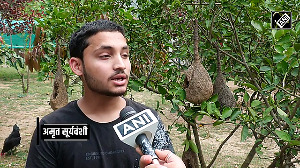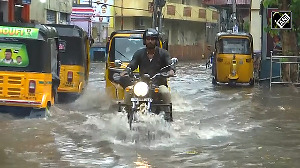Abraham says the fear of landmines scared him stiff. And then there were bomb threats from the re-emerging Taliban when the film was shot in Afghanistan for over six weeks last year.
"The threats were very real," says Khan. "The Afghans could be one of the biggest admirers of Hindi movies but the Taliban have a different way of looking at the world. Remember these are the guys who banned movies and music in their country."
Once the threat seemed so dangerous that he shut down the shoot for nearly a week. "We had to find out how serious the threat was," he adds. After the government offered additional security, the shooting restarted.
Towards the end of the shoot, Abraham fell sick, and Khan suggested the shooting be postponed.
"I refused," says Abraham, who was flown to Mumbai soon after the shoot was over, and spent nearly three weeks in hospital battling a raft of problems some caused by a miserable diet (he is mostly a vegetarian).
He was afraid that if the shoot is postponed, it might take some time to get back to Afghanistan. "And who knew what the Taliban was going to do?" the actor asks with a sigh. The film tells the connecting stories of three journalists, two Indians (Arshad Warsi and Abraham) and an American, a fleeing Taliban supporter from Pakistan and an Afghan who hates the Taliban. It is one of the half a dozen Indian feature films at the Toronto International Film Festival.
The film tells the connecting stories of three journalists, two Indians (Arshad Warsi and Abraham) and an American, a fleeing Taliban supporter from Pakistan and an Afghan who hates the Taliban. It is one of the half a dozen Indian feature films at the Toronto International Film Festival.
"We knew we were going to face problems in Afghanistan," says 36-year-old Khan who has shot a documentary in Kabul soon after the fall of the Taliban in October 2001. "But I never thought that the problems could threaten our lives. However, there was no way I could give up this project."
It was during the shoot of his documentary that he got the idea to make his first feature film, set in post 9/11 Afghanistan. He recalls a Taliban prisoner he met during the documentary shoot who begged Khan to lend him a satellite phone for a few minutes. The distraught man then called his family in Pakistan and spoke to his five-year-old daughter.
"It was the first call he had made to his family in more than five years," Khan recalls. "And that made me think differently of terrorists. We often tend to think of them as despicable, cruel people but within a movement like the Taliban, there were people who weren't your typical militants. Some of them had left their countries, in my film's case Pakistan, at the behest of the government to work with the Taliban."
In the film, the Indian journalists slowly get to know the reluctant Taliban supporter and the love for his daughter.
Just as the film was being shown in Toronto, the newspapers and television stations in Toronto were still carrying stories on the families of the Canadians killed in explosions in Afghanistan.
"Perhaps our film is being shown at the wrong time. I have been asked by some viewers why I show the Taliban in a sympathetic light," muses Khan. "But this movie also challenges the viewers to look at Afghanistan in a new light. It makes clear our opposition to terrorism and the Taliban but it also makes a case for redemption some people can have."
"I could have made the film in India and saved a lot of money," Khan says of his $2.5 million film. "But it would not have been the same film. Each of the actors including the Afghan who plays the Taliban-hating driver helped to make the film authentic."
Khan worked on the script for over a year and got positive response from many Bollywood producers. But most of them either chickened out or suggested drastic revisions. Some certainly wanted songs. "I love good Bollywood musicals," Khan says. "But this film was not going to have songs."
Imagine his surprise then when filmmaker Aditya Chopra, who has directed one of the all-time great musicals Dilwaye Dulhania Le Jayenge, came forward to produce the film under the Yash Raj Films banner.
"He has been looking for offbeat subjects that could attract international audiences to his films," Khan says. "He believed in the script and there was not a line he wanted changed. What was even more surprising is that Adi signed me to direct three films for him, just based on his faith in the Kabul Express script."
Khan is not sure what his next project would be. "It could be set either in Kashmir or Burma," he said.
Whatever the fate of Kabul Express at the box-office is, Khan says, the fact that the film was produced by one of Mumbai's best-known studios, and that two leading actors readily agreed to act in it shows how the Indian film industry is maturing.
"Looking at many of the recent films made in India including the fabulous Lage Raho Munnabhai," he asserts, "All of us, all the filmmakers, can take pride that we belong to the Indian movie industry."







 © 2025
© 2025